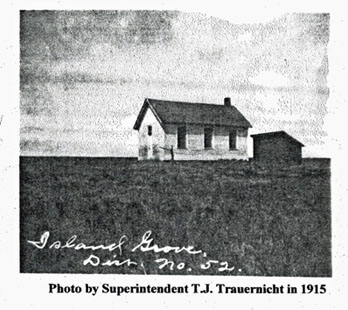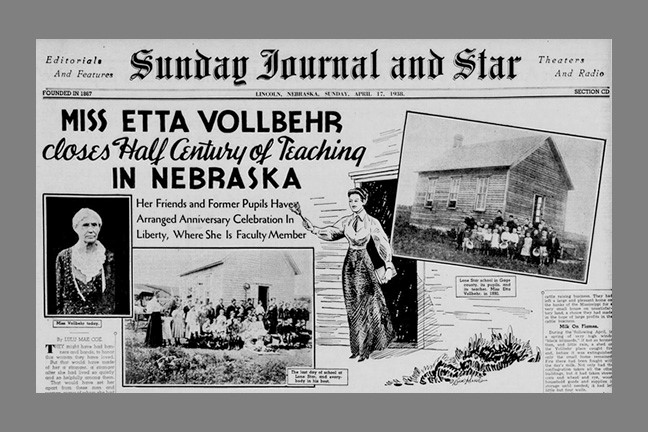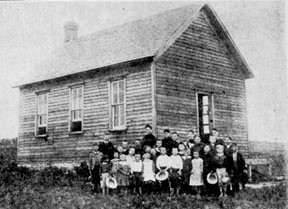MISS ETTA VOLLBEHR
Half Century of Teaching in Nebraska
Sunday Journal and Star
April 17, 1938
By Lulu Mae Coe
They might have had banners and bands to honor this woman they have loved …
but that would have made her a stranger, a stranger after she had lived so quietly and so helpfully among them.
That would have set her apart from these men and women, many of whom she had known as babies, whose parents and grandparents had been her friends, her pupils too.
And so they chose a quiet observance for a May Sunday, when she and her friends from Gage county and from more distant points will be together to remember many past years, some of them a half century gone.
Miss Etta Vollbehr is a part of the life of many families in south Gage County. She is now on the faculty of the Liberty school, but her own life, her long years of teaching, have woven their histories and her own together. She has never gone far from this pleasant agricultural scene of wide meadows, lightly timbered streams and hills that roll gently to the horizon.
No Roamer
She is not a Nebraskan, her birthplace is Sabula, Iowa. The eight years before Etta Vollbehr and her parents came to south Gage county is the longest she has been absent from the vicinity. In May 1888, she began her teaching in a school near her home and those fifty years have not made a roamer of her.
Miss Vollbehr's first position was in Lone Star School, nine miles northwest of Liberty. She was just out of the country school, a girl of seventeen, with ten pupils. A couple of the girls were around fourteen, possibly represented the seventh grade; the others were younger. The new teacher taught the three Rs, geography, physiology, grammar, spelling, history, civics, this just introduced to school.
The teacher with whom she had closed her own rural schooling, Mrs. Lottie Carter, of Yates, Kansas, had aided the girl greatly in preparation for her teacher's examinations. She passed them easily; continued to pass them.
Fortunately yes, from a financial standpoint. Probably unfortunately, for it I had failed, I would have continued my education. Miss Vollbehr says.
As the years passed, Miss Vollbehr has added to what she considers her rather meager qualifications of fifty years ago. She has studied a year at the university and has spent countless summer sessions here and now holds requirements for a professional grade certificate.
Fine Collection
Another rather more indirect source of her early education was the library of Mr. Brazil, who came from England to make his fortune in the sheep business. He didn't, but that was of less concern for Etta Vollbehr than his really fine collection of books. She read all of Dickens and Thackeray and many another classic, feeding a mind starved for books in a pioneer country that hadn't had time for library service then. Some of them, she was scarcely able to grasp, but she dug right in, overjoyed at the chance. This English stranger influenced all the young people, for he brought a new, delightful culture to a region where work alone could carry the people through many a hard year; and the youngsters loved his accent and his manners.
The Vollbehrs had come from eastern Iowa I August 1878 to reside upon a farm that adjoined a large tract of college land, where Mr. Vollbehr was to go into the cattle raising business. They has left a large and pleasant home on the banks of the Mississippi for a very small house on unsatisfactory land, a choice they had made in the hope of large profits in the cattle business.
Milk on Flames
During the following April, in a spring of very high winds, "black blizzards," if not so termed then, and little rain. A shed on the Vollbehr place caught fire and before it was extinguished, on the small house remained. Fire there had be fought with the day's milk. Not only had the conflagration taken all the other buildings, but it had taken stored corn and wheat and rye, wood, household goods and supplies in storage until needed; it had left little for four walls.
It required many years for a pioneer family to recover from such loss and young Etta Vollbehr was happy that she found a teaching position in 1888 so easily.
In those days, the school terms generally consisted of two months each in the spring and fall and four months in the winter. School boards preferred men for the winter, when the big boys were in attendance; but lacking a man, a woman would do, Miss Vollbehr often did.
Lone Star School 1890
For eight years, her time was divided between four districts close to her home: Lone Star, Old Wildcat (where her pupils had been her schoolmates), Island Grove and Island Grove Center. It was said Miss Vollbehr was regarded as a godsend by other teachers, for the competitive bidding by various school boards for her services kept wages up and all the others benefited. At that, her first month's check and for some time to follow was $22.50. She varied her service in the four schools that cornered each other to teach a term or so in Blue Valley School, west of the others.
In 1896, Miss Vollbehr went to Superior to serve as principal of the grade school ad remained a second year as primary instructor. The excursion out of the country closed with that year as Mr. Vollbehr was ill and wanted his daughter to return. More years at the Four Corner schools, election to the Liberty faculty, a year in Beatrice and another term at old Wildcat (somebody is reputed to have shot a wildcat thereabout in the days since the cats roamed freely) followed. Miss Vollbehr then had a year a Frog Pond (District 66) Pleasant Hill, the name depending on the year one attended.
Teaches 17 Years
Miss Vollbehr the returned to Liberty for three years, after which she served for two more at Union Center. To provide herself a change, she spent a year in the post office and for the last seventeen years or so has been in the Liberty school, where she now teaches the sixth, seventh and eighth grades.
She now has decided life has marked her for a Gage county teacher. Sunday, May 1, when her friends and former pupils will gather for the golden anniversary celebration of her teaching, a half century of Nebraska teaching. Miss Vollbehr regards as a milestone, but not a stopping point. She has been re-elected for the next year and she hopes to be re-elected for quite a few years to come.
Miss Vollbehr has taught several three-generation groups in her days behind the teacher's desk. Her sister, Mattie Vollbehr Andrews was a pupil as were her six children: Everett, Charles, Alice, Clarice, the twins Edward and Tyleen, also went to school to Aunt Etta. T. E. Jones of Klamath Falls, Oregon; Mrs. W. C. Showen of Liberty and young Franklin Showen make up another three generations. Another to the third generation is composed of Margaret Goin Hesston, Grace Heaston Hart and Kenneth Hart.

Last day of school at Lone Star (undated)
There are a couple of grandfathers in Liberty who always enjoy telling Miss Vollbehr she applied corporal punishment when they were in school. They have come to the point where they admit her enforcement of sparing the rod adage was necessary, no matter how noisy their protests when they were small shavers with a penchant for mischief. Miss Vollbehr insists she wasn't any too strong for that mode of punishment, but when it was necessary, she was the one to do it.
Basketball Fan
The Liberty school basketball team has no more ardent fan than the teacher who soon completes fifty years of teaching. That the phrase used by a current pupil to describe her the best teacher I ever had goes ringing back through the years in a broadening phase is illustrated by a remark made to the present superintendent of the Liberty schools, Louis Decker. A resident of a neighboring community said he had not gone to school to Miss Vollbehr, but that he had taken eighth grade examinations under her. I was the last one in the room, he recalled. When all the others had gone, Miss Vollbehr sat down beside me and while she was sitting there, I passed the eighth grade examination.
For the program on the first Sunday in May, Miss Vollbehr's first school is to be reproduced. Some of those pupils, it is hoped some will be there, are Austin Miller, Beatrice of her first class; Betty Lelby Blickenstaff, Holdrege; Miss Dorothy Wisdom, Wymore; Bridge Higgins Oats, Minneapolis, Kansas. The basket dinner at 12:30 o'clock at the school is to be followed at 2 o'clock by the program. Music and remarks of tribute will comprise the remainder of the program.
They will make the formal program, yes, but they will talk of the old top buggy in which Miss Vollbehr always appeared at singing school, church services and entertainments, spelling bees and box suppers, for she loved community gatherings and always took part in them. They will tell of her thought for others, of her total forgetfulness of self, of her conscientious devotion to duty, of the collapse of the picnic table on the last day of school at Wildcat and the scramble to rescue the ham sandwiches and potato salad. They will tell of her efforts to establish a library at Wildcat, proceeds from box suppers and programs going for this purpose. They will talk of that of that first school and she will remember the young girl living eight or nine miles from town, riding lumber wagons, wanting books, long for them, wading waist dep in snow to school, starting the fires, serving as her own janitor.
Enjoyed Work
Perhaps among the guests on that May Sunday will be Mrs. Alma Bickett Crocker of Liberty, Etta's teacher at Wild Cat. Miss Vollbehr will say that she really enjoyed her rural school work, in spite of its hardships coincident with an earlier day, that she never has thought she would care for city teaching.
She will tell that when she first taught, which a superintendent came out to instruct her in the method, he didn't know much more of the intricacies than Miss Vollbehr. All subjects were graded on the basis of reading, if a child could get a professional touch there, he was certain of satisfactory grades in the other subjects. It was custom to go as far as possible in a book one year and to take up from that point the following year. There was repetition and reiteration often, but the boys and girls knew their subjects. There was something to be said about that method, Miss Vollbehr states.
A number of those there will laugh at the memory of the little boy and the kitty with a stripe down the back that he chased on the way to school. He was invited to study behind the school, the young teacher was too kind to send him home. It was my first term too and I really didn't quite know how to handle it. She laughs. He even had to recite outdoors. He couldn't do it alone among the winds, so it was suggested everybody go out to recite with him. The suggestion was followed. It may have been prompted by some little boy's eagerness to go outdoors quite as much as by a loving spirit for a fellow in distress.
The committee for the anniversary celebration includes: Mrs. R. L. Earnhart, Liberty as chairman, Mrs. Guy Stahl, Wymore historian, Mrs. Hardin Searcey, Liverty Mrs. Olin Currey, Burchard; Austin Miller, Beatrice; W. F. Huntington and Mrs. Walter Smith, Liberty; Mrs. Joe Hilyard, Superior; Glen Bowhay, treasurer, and L.L. Decker, Liberty as secretary.
Is a Musician
Miss Vollbehr is a musician and often has gone about in the old top buggy to give lessons. Always interested in music, she was ten when Mrs. Fanny Hardy loaned an organ for the exercises on the closing day of school. She recalls to this day how she longed to try it, but was afraid to touch the grand instrument. In Superior, she was a member of the ladies quartet.
Although no required to do so, she always has taught music in her classwork. Some of those who were in her room at Wild Cat recall her, tuning fork in hand, four rows of pupils divided into parts, throats about to burst waiting for the pitch. The singing school of her youth was one of its pleasant diversions.
Island Grove 1915
Another pastime in which Miss Vollbehr took part was the writing school, where persons really learned to write in a legible hand. Those eager to get in on the latest flourishes would pay 50 or 75 cents for a course, going to some community center for instruction. She always enjoyed coaching plays and entertainments and is of the generation that had Friday afternoon exercises. Many a verse of The Boy who stood on the Burning Deck and Horatius at the Bridge and lines of Burial of Moses have been thundered into her patient ears. Oh, we would try anything, she laughs.
William Beckner, superintendent of schools at Elgi, Illinois; Harry Darner, on the faculty of Washington D.C. University and John O'Brien, a Seattle lawyer are among the more famous of her pupils. Pearl Darner Hinnemkamp probably hold the long time record as Miss Vollbehr's pupil. She was in her class for seven years and had only one other teacher in her rural school days.
The fifty years have been happy years, Miss Vollbehr says. I have done what I wanted to do from childhood.
My age does not trouble me, she smiles. I have never been far enough away from the people I know to hide it.
Sunday, May 1, friends and pupils will observed the completion of Miss Vollbehr's fifty years of teaching. For her, it is but the beginning of another fifty.
Possibly next autumn when school opens, another little boy will come to her, dragging a small brother by the hand and say, as one you O'Brien did:
Well Miss Vollbehr, here's another colt for you to break
Island Grove Township - Gage County
1906 Four Corner's SchoolsLone Star District 146 (Section 8) also known as O'Brien
Wild Cat District 25 (Section 4)
George Wright District 153 (Section 16)
Island Grove Center District 52 (Section 18)

